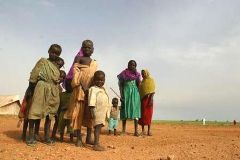Sudan peace talks deadlocked in new aid squabble
By Tume Ahemba
ABUJA, Aug 29 (Reuters) – Peace talks between Darfur rebels and the Sudanese government ended a day of negotiations deadlocked on Sunday over addressing what the United Nations has called the world’s worst humanitarian crisis.
 Rebels leaving the evening session said African Union (AU) officials, mediating in the talks in the Nigerian capital Abuja, were preparing a draft compromise to present when talks resumed on Monday afternoon.
Rebels leaving the evening session said African Union (AU) officials, mediating in the talks in the Nigerian capital Abuja, were preparing a draft compromise to present when talks resumed on Monday afternoon.
The latest snag was disagreement about conditions in refugee camps, rebels said.
“There is a big distance between what we think about improving the humanitarian situation in the camps and what the government thinks,” said Ahmed Mohammed Tugod, negotiator for the Justice and Equality Movement (JEM) rebel group.
The talks, which began last Monday, had so far foundered on squabbling over disarmament and accusations about ceasefire breaches.
Talks resumed on Sunday after a 24-hour boycott by rebels who accused Khartoum of violating a ceasefire by killing 75 civilians in six villages.
The African Union has launched an investigation into those allegations, the latest in a series of tit-for-tat accusations about violations.
“The ceasefire commission has already commenced investigations and is expected to put in its findings during the week,” said AU spokesman Assane Ba in Abuja.
The peace talks are intended to find a political solution to the conflict, which escalated in February 2003 after years of low intensity fighting between Arab nomads and mainly African farmers over scarce resources in the vast arid region.
Up to 50,000 people have died since the conflict began and more than a million Darfuris have fled their homes for fear of Arab militia, known as the Janjaweed, mobilised by the government in a campaign to crush the rebels.
The new squabble between the delegations from Darfur’s JEM and Sudan Liberation Movement (SLM) and the government came just a day ahead of a U.N. Security Council deadline for Sudan to improve security for refugees or face sanctions.
ACCUSATION
Sudan’s interior minister accused rebels of their own ceasefire violation and said the Khartoum government had met U.N. demands.
“I think that we expended a huge effort and have fulfilled our commitments to the United Nations 100 percent,” Abdel Rahim Mohamed Hussein told reporters in the Sudanese capital on Sunday.
“We are expecting in the next month to deploy in excess of 2,000 extra police we think that in that way we will be able to cover the whole of Darfur.”
“In the el-Fasher area, the rebels violated the ceasefire and our U.N. security agreement three times in several areas,” the minister added. “I think if the violations of the rebels and outlaw groups in Darfur were to cease then there would be no security problems.”
The Sudanese government says the rebels are stalling talks to increase pressure on it to make concessions ahead of the Aug. 30 U.N. deadline.
But rebels say attacks are undermining a possible deal.
“Ceasefire violations put us in a moral dilemma. We are here talking and our people are being killed every day,” said one, adding that an attack on Sunday in Darfur would be reported to the ceasefire commission. No further details were available.
Rights groups have accused Khartoum of restricting food and medical supplies to refugees housed in makeshift camps in Darfur, although international agencies say access has showed some improvement.
Following a tour of Darfur, U.N. special envoy Jan Pronk has said food security was improving at the camps.
But refugees in camps Pronk visited said human rights violations continued, with the areas often infiltrated by Janjaweed agents and marauding militias terrorising civilians who strayed from the camps.
New York-based Human Rights Watch said on Friday Janjaweed were still maintaining at least 16 military camps in Darfur, despite pledges to disarm the fighters.
